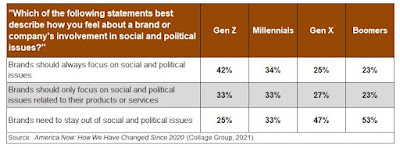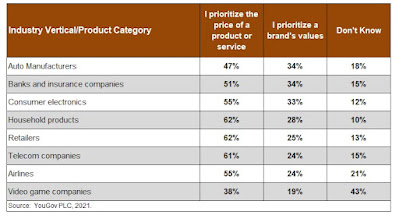 |
| Source: Shutterstock |
In January of this year, I published a lengthy article here discussing the topic of purpose marketing, which can be defined as the use of content in external communications that emphasizes a company's core mission and values, i.e. its brand purpose.
A company's brand purpose describes its "reason for being" beyond the basic business functions of offering products or services and earning a profit. The brand purpose encompasses how the company is making a positive contribution to society and where the company stands on important social issues.
For the past few years, marketers have been inundated by research studies purporting to prove that consumers and business buyers now place great importance on the social responsibility track record of the companies they do business with. Many of these studies also indicate that buyers now expect companies and brands to "take a stand" on important social issues. As a result, many marketers have become enamored with purpose marketing.
As I wrote back in January, the decision to use purpose marketing is far more nuanced than the current tsunami of hype would suggest. Fortunately, three recent surveys provide a more balanced view of consumer attitudes regarding the importance of corporate social responsibility and brand purpose. The findings of these surveys show that while values matter to consumers, their expectations of companies and brands are mixed.
The Collage Group Survey
Last fall, Collage Group surveyed 4,140 American adults (ages 18-75) regarding a wide range of issues. The data presented in the survey report were weighted to be nationally representative of race/ethnicity, Hispanic acculturation, age, gender and sexuality.
The Collage Group survey revealed little consensus among American consumers regarding the proper role of companies and brands in social issues. Only 30% of the survey respondents said companies/brands should always focus on social and political issues. Another 28% said they should only focus on those issues that are related to their products or services. And 42% of the respondents said companies/brands need to stay out of social and political issues.
Not surprisingly, younger consumers are more likely to believe that companies/brands should always focus on social and political issues. The following table shows how survey responses varied across four generational cohorts.
The YouGov Survey
Recent research has also provided insights regarding how much importance consumers place on brand values when making purchase decisions. In August of last year, YouGov surveyed consumers in 17 global markets. The researchers asked survey participants whether they prioritized price or brand values when making purchases in eight industry verticals. The following table shows how the survey participants responded.
As this table shows, more consumers prioritize prioritize price than prioritize a brand's values when making purchases in all eight industry sectors.
The Merkle Survey
When it comes to consumers' expectations of companies/brands regarding social responsibility, it shouldn't be surprising that consumers place more importance on some actions than others. In an October 2021 survey of 1,000 U.S. consumers by Merkle, researchers provided survey participants a list of eight actions and asked participants to rate the importance of those actions. The following table* shows the percentage of survey respondents who rated each action as very important.
As the above table shows, the members of this survey panel were most concerned about how companies treat their employees. The only two actions a majority of survey respondents deemed very important were treat employees fairly and keep workers safe. It's also noteworthy that only 16% of the survey respondents said it is very important for companies/brands to take a stand on political issues.
The Takeaway
The findings of these three surveys do not demonstrate - or even suggest - that purpose marketing is a bad idea. But they do show that the decision to make purpose marketing part of your marketing strategy isn't as clear cut or simple as the current hype would suggest.
*The data in the table is based on a description of the Merkle survey results contained in a report by eMarketer titled, "Spotlight: What Values-Driven Consumers Really Want."







No comments:
Post a Comment